冀教版初三下册_Unit_1_You_Can_Write_Poetry_Lesson_1_Poetry_Please
冀教版英语九下unit 1 you can write poetryword学案
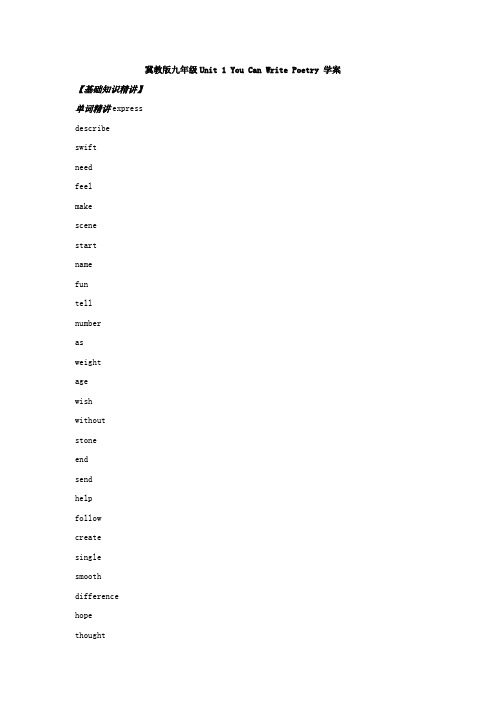
冀教版九年级Unit 1 You Can Write Poetry 学案【基础知识精讲】单词精讲expressdescribeswiftneedfeelmakescenestartnamefuntellnumberasweightagewishwithoutstoneendsendhelpfollowcreatesinglesmoothdifferencehopethoughtancientenoughsurprisesuremelt词组精讲be input onbe dressed inthink ofthink aboutthink overat the end ofbring sth to an endcome to an endin the endend intell a storymake a jokemake a joke about sb /sth play a joke on sbmake fun offor funhave funas followsfollow afterlook afterlook intolook uplook outlook down uponlook up tolook forlook overlearn /know sth by hearta set number of【重点知识拓展】Would sb like to do sth ?Sb would like to do sth .Both ……and ……Either……or……Neither…….nor……What should sb want to do if sb would like to do sth ?Make sb /sth adjAs …….asSb expect to do sthIt’s one’s turn to do sth .【中考考点衔接】选择填空(11) I'll arrive in ______ hour.A. aB. anC. 不填 ( )(12) They got to the moon ______ spaceship.A. onB. atC. by ( )(13) Mary helps me ______ my English.A. toB. forC. with ( )(14) ______ good boy he is!A. What aB. WhatC. How ( )(15) Liszt gave her some ______.A. advicesB. adviceC. of advices ( )(16) I can't work out the me ______.A. think it overB. think itC. think of it ( )(17) Can you tell me where ______?A. is the zooB. the zooC. the zoo is ( )(18) English ______ in many schools in our country.A. is taughtB. taughtC. has taught ( )(19) I don't want the bad smells ______.A. terribleB. niceC. nothing ( )(20) In spring it gets ______.A. warm and warmB. more warmC. warmer and warmer ( )。
冀教版初三下册_Unit_1_You_Can_Write_Poetry Lesson 8 Unit Review

常用动词不定式作宾补的动词有:tell, ask, want, warn, wish, allow, encourage, expect, teach, help …
感官动词和使役动词等后接不定式作宾补 时,需省to。但在被动语态中要还帽子。
The boss makes them work 15 hours a day. I saw the accident happen yesterday. He was made to do his work (by me). watch see look at observe notice let make have hear
定义
动词不定式是非谓语动词的一种,它 没有人称和数的变化,在句子中不能 独立作谓语,动词不定式具有名词, 形容词和副词的特征,它也仍保持动 词的特点,它可以有自己的宾语和状 语。这种带宾语或状语的不定式结构 称为“不定式短语”。
请你思考:动词不定式在句子中可以作什么 成分? 1. 作主语 2. 作宾语 3. 作宾语补足语 4. 作定语 5. 作状语 6. 作表语 7. 与疑问词等连用
句型转换,每空一词: 6. Our teacher often teaches us how we can write English poems. (同上) Our teacher often teaches us ______ ______ ________ how to write English poems 7. She decided to teach physics this term. (对划线部分提问) _________ ________ she decide ______ ______ this term? What did to do 8. They all hope that they can visit the Great Wall someday. (同义句) They all hope _______ _______ the Great Wall someday. to visit
九年级_冀教版九年级下册 Unit1 You Can Write Poetry
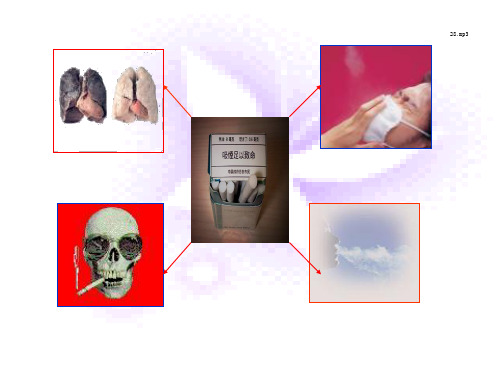
be away 表状态,后可加一段时间,表示此动作已延续一 段时间.
注: for+一段时间
since+一个时间点
Eg. He has been away
since three days ago.
--How long has he ____ here?
--He has ____ here for several hours.
e.g. ① There are plenty of eggs in the market.
② I need plenty of time to finish my homework.
Language Points
6.I would like to make a poster about smoking make a poster about 做一张有关…的海报
Language Points
9.If I breathe too much cigarette smoke, I get a headache.
too much 修饰名词,much too 修饰形容词或 副词
口诀:too much, much too, 去掉前词看后头; much可接不可数(n.), too则修饰形(adj.)或副(adv.)。
增加了高血压的危险。
Lesson 4 Don’t smoke, please.
学习目标
❖1.掌握本课的短语、身体问候及吸烟 有害健康的句型.
❖2.认识吸烟的危害,远离香烟.
Ⅰ、Discuss:
1、Is there anyone smoke in your family ?
2、Have you ever seen students smoke in your school ?
英语:Unit-1-《You-can-write-poetry》lesson-3课件(1)(冀教版九年级下)
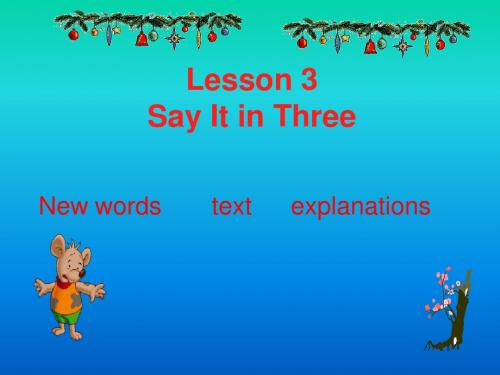
Almost every day we have a set number of
homework in China.
Interruption n. 中断; 遮断; 打断; 干扰 interruption of communication 交通中断 service interruption 服务中断(指停电、停水等) Numerous interruptions have prevented me from finishing the work. 数不清的干扰使我未能完成这项工作。
Pattern n.形式;模式
New words
Set adj.固定的;规定的 a set number of固定数量的;一
定数量的 Syllable n.音节 Interruption n.中断;打断 Clearly adv.清楚地 Sleepy adj.困倦的;寂静的;冷 清的 Unexpected adj.出乎意料的;意 外的 Frog n.青蛙 Plop n.扑通声;落水声 Splash v.溅起;溅落
Haiku
Snow is very (so)________ (colour), See me run through it _________ (adverb with ly at the end), It makes me feel_________ (temperature).
Thank you ! Good bye!
Lesson 3 Say It in Three
New words text explanations
New words
Direction n.方向 Petal n.花瓣 Cherry n.樱桃 Grebe n.鸊鷉 Matsuo Bash松尾马生 Haiku n.俳句 Form n.形式;体裁 Particular adj.特别的;独特 的 Poet n.诗人 Simply adv.仅;只有
九年级英语下册Unit1YouCanWritePoetry冀教版
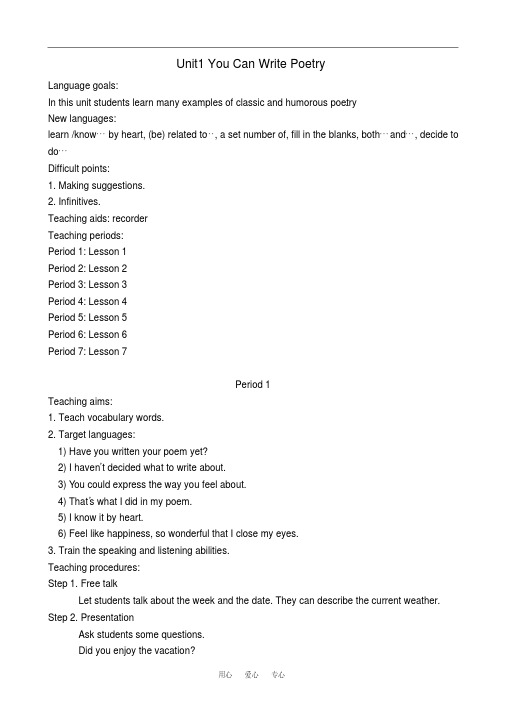
What kind of poetry is Jenny going to write? Why? 2. Play the audiotape. Have the class follow along in their texts. Step 4. Discussing Divide the class into small groups. Ask each group to discuss the reading, using as much English as possible. Ask the students to discuss Dann’sy poem“The Donut”. Step 5. Let’s Do It Discuss the question with a partner: which is more difficult to understand, English poetry or Chinese poetry? You may begin with one of these phrases: Chinese / English poetry is harder/easier, becau…se I prefer Chinese/English poetry, because… Step 6. Homework 1. Revise the vocabulary words in this lesson. 2. Read the poem“The Donut”and try to recite it.
九年级英语下册Unit1 You Can Write Poetry Lesson2 Poems About Nature冀教版
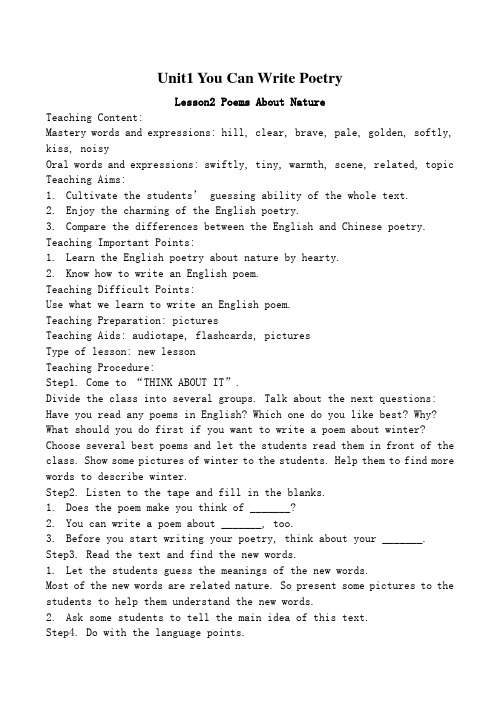
Unit1 You Can Write PoetryLesson2 Poems About NatureTeaching Content:Mastery words and expressions: hill, clear, brave, pale, golden, softly, kiss, noisyOral words and expressions: swiftly, tiny, warmth, scene, related, topic Teaching Aims:1. Cultivat e the students’ guessing ability of the whole text.2. Enjoy the charming of the English poetry.3. Compare the differences between the English and Chinese poetry. Teaching Important Points:1. Learn the English poetry about nature by hearty.2. Know how to write an English poem.Teaching Difficult Points:Use what we learn to write an English poem.Teaching Preparation: picturesTeaching Aids: audiotape, flashcards, picturesType of lesson: new lessonTeaching Procedure:Step1. Come to “THINK ABOUT IT”.Divide the class into several groups. Talk about the next questions: Have you read any poems in English? Which one do you like best? Why? What should you do first if you want to write a poem about winter? Choose several best poems and let the students read them in front of the class. Show some pictures of winter to the students. Help them to find more words to describe winter.Step2. Listen to the tape and fill in the blanks.1. Does the poem make you think of _______?2. You can write a poem about _______, too.3. Before you start writing your poetry, think about your _______. Step3. Read the text and find the new words.1. Let the students guess the meanings of the new words.Most of the new words are related nature. So present some pictures to the students to help them understand the new words.2. Ask some students to tell the main idea of this text.Step4. Do with the language points.Make sentences with the new words we learn in this text.Ask if someone can tell a story with the words we learn today. Encourage them to stand in front of the class and tell his story to us.Step5. Reading taskEncourage the students to ask questions about this text.Finish the task in groups. Let the students design questions and exchange them in groups. They can ask questions like this:1. What are your ideas for a nature poem?2. What can you do to describe about something?Step6. Activities.Work in groups.Write a poem about the two pictures. Finish a poem. Then each student in the group correct it before reading it to the class.Step7. Come to “LET’S DO IT!”The task is similar to the step6. Finish it in class. Try to write a poem about one of the seasons. The teacher shows some pictures about the seasons to the students.Step8. Homework1. Finish off the exercises in activity book.2. Go on the next reading in the student book.Summary:It is fun and interesting to write a poem in English. The teacher tries to write a poem and presents it to the class. Let the students correct it if they have any good ideas. Some students are interested in English, and they are also interested in poems. So give them more chances to create their minds.。
1.1 Unit1 You Can Write Poetry 同步素材(冀教版九年级下册)
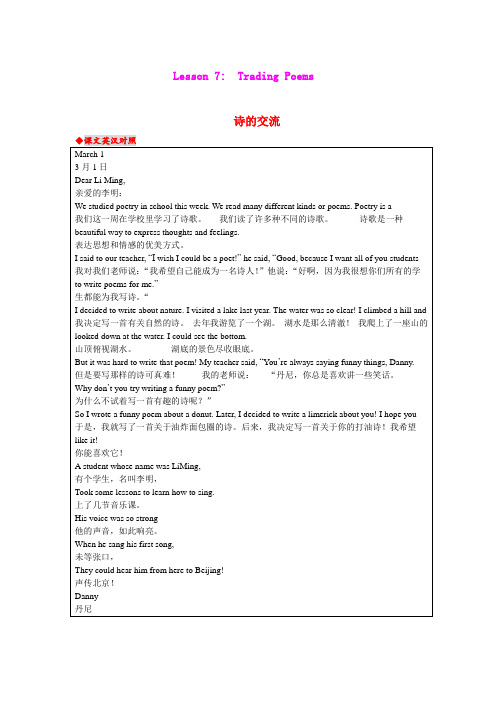
Lesson 7: Trading Poems诗的交流LET’S DO IT!做一做!In a small group, write a poem like the one in LiMing’s postcard. First, choose a word your group 以小组为单位,写一首像李明的明信片上的那样的诗。
首先,选一个小组成员都喜欢likes. Use each letter in this word to begin a line of your poem. Then, make a poster to display的单词。
用这个单词中的每一个字母作为你们诗歌每一行的开头。
然后将你们的诗张贴your poem on the wall. Which poem is the best?在墙上。
比一比,哪首诗最好?◆重点难点详解1. Good, because I want all of you students to write poems for me. 好啊,因为我很想你们所有的学生都能为我写诗。
(1)because在句中是连词,表示直接的原因。
=all+可数名词复数。
同类的还有many/some/ any/ most/both of +名词复数=many/some/ any/ most/both +名词复数;one of +可数名词单数= one +可数名词单数。
●Some of / Some people were killed in the war.一些人在战争中被危害。
Most of/ Most students do their homework until 12 o’clock at night. 大部分学生做家庭作业直到夜晚十二点钟。
(3)you students 是同位语,在句中作want的宾语同位语。
同位语是一个名词、短语或从句对另一个名词或代词进行修饰,限定或说明,这个名词名词、短语或从句就是同位语。
冀教版英语九下《Unit 1 You can write poetry》(lesson1-4)word教案
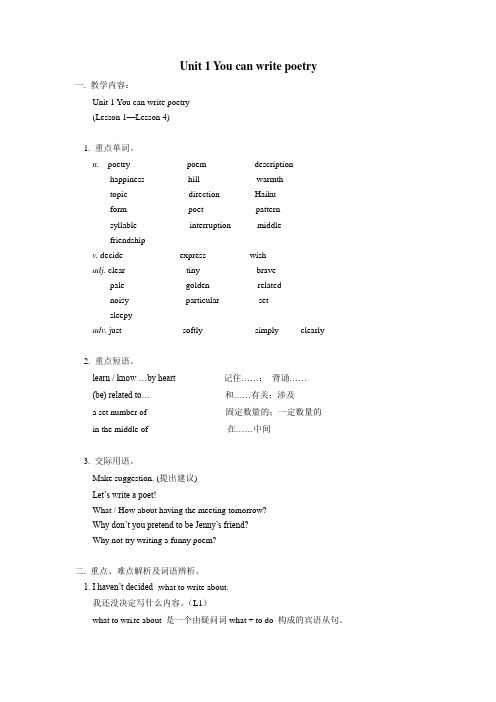
Unit 1 Y ou can write poetry一. 教学内容:Unit 1 You can write poetry(Lesson 1—Lesson 4)1. 重点单词。
n. poetry poem descriptionhappiness hill warmthtopic direction Haikuform poet patternsyllable interruption middlefriendshipv. decide express wishadj. clear tiny bravepale golden relatednoisy particular setsleepyadv. just softly simply clearly2. 重点短语。
learn / know …by heart 记住……;背诵……(be) related to… 和……有关;涉及a set number of 固定数量的;一定数量的in the middle of 在……中间3. 交际用语。
Make suggestion. (提出建议)Let’s write a poet!What / How about having the meeting tomorrow?Why don’t you pretend to be Jenny’s friend?Why not try writing a funny poem?二. 重点、难点解析及词语辨析。
1. I haven’t decided what to write about.我还没决定写什么内容。
(L1)what to wri te about 是一个由疑问词what + to do 构成的宾语从句。
在宾语从句中,当主句的谓语动词为know , ask , decide, be sure 等时,且主句的主语和从句的主语保持一致的话,可把宾语从句省略为疑问词加不定式。
最新冀教版英语九年级下册《unit 1 you can write poetry》lesson5-8教案.doc

Unit 1 You Can Write Poetry一. 教学内容:Unit 1 You Can Write Poetry(Lesson 5~Lesson 8)1. 重点单词:n. limerick blank motion fur thought avenuev. create stretchadj. single awake]2. 重点短语:both … and…既……又……;不但……而且……fill in the blanks 填空decide to do …决定做……3. 语法:动词不定式二. 重点、难点解析及词语辨析:1. Huge and beautiful!巨大的和美丽的。
(L5)huge adj. 极大的,巨大的。
反义词是tiny,副词是hugely,名词是hugeness。
a huge house 一幢巨大的房子 a huge success 一次巨大的成功[网]辨析:big, large, huge①big adj.大的,指具体事物,多指体积之大,还可以表示“巨大,伟大,重要”。
反义词是little.He is a big man.他是个大人物。
②large adj.大的,多指面积之大。
China is a large country.中国是个大国。
(强调面积)③huge adj.巨大的,强调体型而非重量。
a huge animal 巨大的动物2. You and Brian can both help me.你和Brian都可以帮助我。
(L5)both 两者都;both…and…“……和……都……”,可连接名词,形容词,动词等。
当连接主语时,谓语动词用复数形式,反义词组为neither…nor…“两者都不”①Both he and I are students.他和我都是学生。
否定句:Neither he nor I am a student.他和我都不是学生。
(就近原则)②She can both sing and dance. 她既会唱歌又会跳舞。
九年级英语下册 Unit 1 You Can Write Poetry Lesson 6教案 冀教版
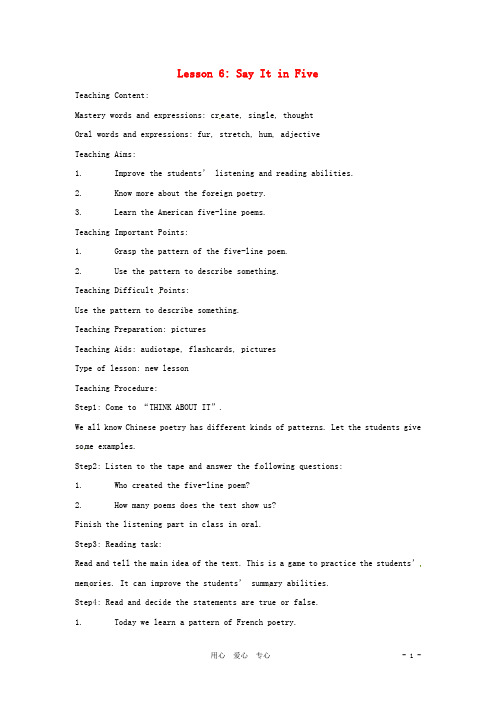
Lesson 6: Say It in FiveTeaching Content:Mastery words and expressions: cr e ate, single, thoughtOral words and expressions: fur, stretch, hum, adjectiveTeaching Aims:1. Improve the students’ listening and reading abilities.2. Know more about the foreign poetry.3. Learn the American five-line poems.Teaching Important Points:1. Grasp the pattern of the five-line poem.2. Use the pattern to describe something.Teaching Difficult Points:Use the pattern to describe something.Teaching Preparation: picturesTeaching Aids: audiotape, flashcards, picturesType of lesson: new lessonTeaching Procedure:Step1: Come to “THINK ABOUT IT”.We all know Chinese poetry has different kinds of patterns. Let the students give so me examples.Step2: Listen to the tape and answer the f ollowing questions:1. Who created the five-line poem?2. How many poems does the text show us?Finish the listening part in class in oral.Step3: Reading task:Read and tell the main idea of th e text. This is a game to practice the students’mem ories. It can improve the students’ summ ary abilities.Step4: Read and decide the statements are true or false.1. Today we learn a pattern of French poetry.2. The second line has three words.3. The topic of the poem is a noun.Finish the questions in class in oral.Step5: Activity:Show some pictures to the students. Let them the favourite one to describe. They can work in pairs. Then show their poems to the class.It’s easy to f inish the task, but it is hard to do it well.Step6: Come to “LET’S DO IT”.Work in groups of three or four students.1. Say the differences between a Haiku and a five-line poem. Say about their different forms and different patterns.Five-line poem has five lines. It is always about a single topic. Each line has a set number of words. The first line has one word. The second line has two words. The third, or middle, line has three words. The fourth line has four words. The last line has one word.2. Finish the task in groups. C hoose one topic as they like. Then exchange the poems among the groups.Step7: Homework1. Finish off the exercises in activity book.2. Ask the students to find more topics after class.Summary:We learn different kinds of foreign poetr y. They are limericks, five-line poems and Haiku. The students may think they are very interesting. Some student s have surprising poems that you didn’t think of. Give them more chances to practice so that they can create their minds.。
冀教版英语九下Unit1Youcanwritepoetry(lesson58)同步测试

Unit 1 Y ou Can Write PoetryLesson 5~Lesson 8一. 单项选择1. He can recite old poem.A. aB. anC. theD. /2. The woman often tells children some .A. storyB. storiesC. storyesD. a story3. Fish can’t live water.A. withoutB. withC. haveD. haven’t4. The young man went out without goodbye to his girlfriend.A. sayB. saysC. sayingD. said5. Please speak EnglishA. clearlyB. clearC. clearsD. more clearer6. Tom doesn’t listen to the teacher John doesA. as careful asB. so careful asC. as carefully asD. such carefully as7. This question is difficult, let’s itA. think;overB. think;aboutC. think;ofD. think;on8. It is today, put on your raincoat.A. rainB. rainyC. windyD. cloudy9. Knowledge practice.A. begins withB. begins onC. begins atD. begins in10. —There is much in the classroom.—Yes, it is too .A. noise;noiseB. noisy;noisyC. noisy;noiseD. noise;noisy二. 用括号内所给单词的适当形式填空1. Haikou always (have)three lines.2. You should pay attention to your (pronounce)3. There are two shirts, one is red, the other is blue. At last, he (choose)the blue one.4. This story sounds (fun).5. He is good at sports , he runs very (quick).6.What should I do if I want (be)a doctor.7. Autumn is coming, and the (leaf)fall from the tree.8. The little girl opened the door (slow).9. We feel the (warm)of the fire.10. You can express the animals by (tell)how it looks like.三. 完形填空In 1608 an Englishman named Thomas Coryate traveled in Italy(意大利). He liked the country and 1 down everything interesting. But he found one thing 2 interesting than the others. In his diary Thomas wrote,“ 3 the Italians eat meat, they use small forks. They do not eat with their hands because, as they say, people do not always have 4 hands.”Before he went back to England, Thomas Coryate bought a few 5 .At home Thomas had a di nner party to show the forks to his friend. When the steak(牛排)was brought out, he took out a fork and wanted to 6 the steak as the Italians did in Italy. His friends were 7 when they saw this. He told them what the fork was. They all said that Italians were very strange people because the fork was not easy to use at all. Thomas Coryate tried to prove that his friends were 8 , so he began to show that it was easy t o use the fork. But the first 9 of meat he took with the fork fell to the fl oor. His friends began to 10 at him and he had to take fork away.People in England began to use forks only fifty years later.1. A. broke B. wrote C. went D. calmed2. A. less B. much C. even D. more3. A. Why B. When C. Which D. Where4. A. clean B. big C. dirty D. safe5. A. knives B. dishes C. forks D. plates6. A. use B. eat C. make D. cut7. A. worried B. bored C. tired D. surprised8. A. honest B. correct C. wrong D. clever9. A. piece B. kilo C. pound D. packet10. A. scream B. look C. shout D. laugh【试题答案】一. 1~5 B B A C A 6~10 C A B A D二. 1. has 2. pronunciation 3. chose 4. funny 5. quickly 6. to be 7. leaves8. slowly 9. warmth 10. telling三. 1~5 B D B A C 6~10 B D C A D。
冀教版英语九下Unit1Youcanwritepoetry(Lesson14)同步测试
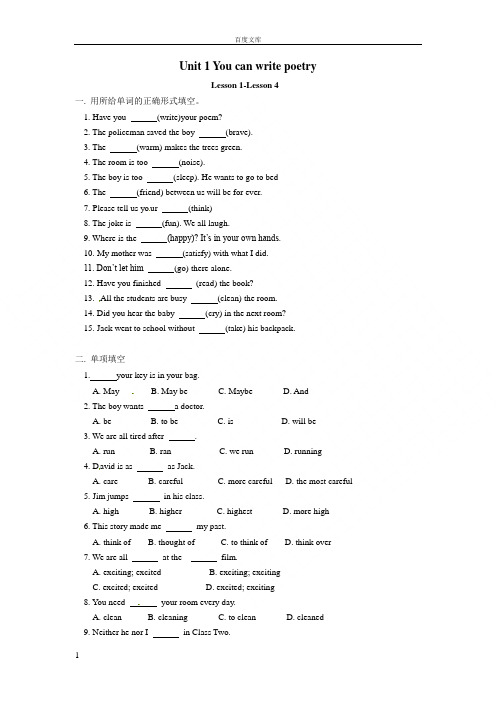
Unit 1 Y ou can write poetryLesson 1-Lesson 4一. 用所给单词的正确形式填空。
1. Have you (write)your poem?2. The policeman saved the boy (brave).3. The (warm) makes the trees green.4. The room is too (noise).5. The boy is too (sleep). He wants to go to bed6. The (friend) between us will be for ever.7. Please tell us yo ur (think)8. The joke is (fun). We all laugh.9. Where is the (happy)? It’s in your own hands.10. My mother was (satisfy) with what I did.11. Don’t let him (go) there alone.12. Have you finished (read) the book?13. All the students are busy (clean) the room.14. Did you hear the baby (cry) in the next room?15. Jack went to school without (take) his backpack.二. 单项填空1. your key is in your bag.A. MayB. May beC. MaybeD. And2. The boy wants a doctor.A. beB. to beC. isD. will be3. We are all tired after .A. runB. ranC. we runD. running4. D avid is as as Jack.A. careB. carefulC. more carefulD. the most careful5. Jim jumps in his class.A. highB. higherC. highestD. more high6. This story made me my past.A. think ofB. thought ofC. to think ofD. think over7. We are all at the film.A. exciting; excitedB. exciting; excitingC. excited; excitedD. excited; exciting8. You need your room every day.A. cleanB. cleaningC. to cleanD. cleaned9. Neither he nor I in Class Two.A. amB. isC. areD. be10. I don’t know .A. how beginB. what writeC. where to goD. to choose which三. 完形填空Mrs. Black was a famous musician several years ago. She 1 music at a school and her students did well in the ir lessons. They liked her very much. 2 the old woman sta ys at home with her husband. The old man looks after his wife well and she is 3 worried about anything. Her students 4 forget their teacher when they win their prizes. She often 5 some presents on her birthday and at Christmas , and she is very 6 .Just like some old people, Mrs. Black finds that her 7 is falling. Sometimes she forgets 8 she did or will do . It often gets her in 9 . Her 10 has noticed it and asked her to see a famous doctor who lives in the capital. He bought two tickets 11 London and told her to put12 into her handbag while she was playing the piano. The next morning, when they reached the13 just in time to catch plane, Mrs. Black said, “I wish we’d brought the 14 with us.”“Don’t be a fool, dear!” said Mr. Black. “We are not going to hold a concert, but to see a 15 .”“I know,” she said , “but I’ve left the tickets on it!”1. A. loved B. taught C. enjoyed D. studied2. A. Now B. Once C. Still D. Soon3. A. always B. often C. never D. sometimes4. A. ca n’t B. have to C. must D. would5. A. buys B. prepares C. makes D. receives6. A. nervous B. worried C. sad D. happy7. A. sight B. hearing C. interest D. memory8. A. what B. how C. why D. where9. A. place B. danger C. trouble D. surprise10. A. husband B. daughter C. son D. student11. A. for B. in C. from D. of12. A. it B. them C. this D. that13. A. airport B. bus stop C. station D. bar14. A. money B. music C. tickets D. piano15. A. doctor B. film C. play D. house四. 阅读理解There was a small village by the sea in Amer ica. Every summer lots of people came here to spend their holidays. But a few of them came here only to end their lives. Two months ago righthere a young woman jumped into the sea in the darkness of the night. When she was taken up from the sea, nothing could make her come to life. From then on, the people in the village began to pay more attention(注意) to each of the visitors. If someone looked unhappy or worried, they would watch him all day long with care. They would never let the same thing happen again.A week later, came several visitors. Among them there was a young woman of twenty years old. One day she looked different from others. She went out alone at night. She was found just by a villager made no noise and followed her. When the young woman was walking to the beach, the villager rushed at her and tried hard to pull her back . “Let me go. Don’t pull me!” cried the young woman, “I was playing on th e beach this afternoon. Now I can’t find the key to my suitcase. I think it must be left here.” “But why won’t you look for it tomorrow morning?” said the villager. “Tomorrow morning I’ll leave here and catch the early bus to New York. I must leave before the day break s.”When the villager heard this, he had a good laugh and helped her look for the key in the moonlight.1. The small village was the sea.A. far fromB. nearC. fromD. to2. of the visitors came to this village in order to die.A. FewB. LittleC. A littleD. Several3. Why did a young woman go out alone at night one day?A. To go for a walk.B. To go swimming.C. To look for her key.D. To end her life.4. The villager rushed at the young woman because he wan ted to .A. save herB. ask her for somethingC. kill herD. frighten her5. The woman looked for the key at night because .A. she couldn’t get up early the next morningB. she had something important to doC. she had little time to look for it the next morningD. she wanted to leave the village at once【试题答案】一. 1. written 2. bravely 3. warmth 4. noisy 5. sleepy 6. friendship 7. thought8. funny 9. happiness 10. satisfied 11. go 12. reading 13. cleaning 14. cry15. taking二. 1~5 CBDBC 6~10 ADCAC三. 1~5 BACAD 6~10 DDACA 11~15 ABADA四. 1~5 BDCAC。
- 1、下载文档前请自行甄别文档内容的完整性,平台不提供额外的编辑、内容补充、找答案等附加服务。
- 2、"仅部分预览"的文档,不可在线预览部分如存在完整性等问题,可反馈申请退款(可完整预览的文档不适用该条件!)。
- 3、如文档侵犯您的权益,请联系客服反馈,我们会尽快为您处理(人工客服工作时间:9:00-18:30)。
同义句转换,每空一词:
1. You needn’t finish your poem today.
You ______ finish your poem today. don’t ______ have _______ to You ______ finish your poem today. don’t _______ need _______ to
Unit 1
You Can Write Poetry
Lesson 1
Poetry, Please
学习目标
• 1.掌握新单词及重点短语. • 2.复习现在完成时.
New words
poetry n.诗歌;诗作 shut v. 闭上;合上 • poem n 诗;诗歌 beyond prep. 超过 • decide v.决定;作出判断 • nature n.大自然 • description n.描写;描述 • express v.表达 • pleased adj.高兴的;满意的 • happiness n.幸福;愉快
Language notes: 1. Have you written your poem yet, Brain? 现在完成时常和already, yet, never, ever, just, before, since …连用 already adv.“已经”用于肯定句中 be后 助后 实前 句
13. I didn’t need ___________(answer) it. to answer
14. The room needs ________________________(clean). cleaning/to be cleaned
15. We have already learned some new words and
He ________ to go on time. doesn’t ________ need
________ he ________ Does need to go there on time? Yes, he _________. No, he __________. does doesn’t
用于过去时态 用于现在完成时态
I ________ my homework. have just _________(finish) finished What ________ just now? did you _______(do) do
Language notes:
decide + 宾语从句 decide + 带疑问词的不定式 decide (not) to do sth.
_____________(express). expressions 16. I can’t decide which one ____________(choose). to choose
17. I ___________(finish) my homework just now. finished
Fill in each blank with the proper word from the brackets: 1. The boy decided not ____________(not become) a sailor to become after he graduated. 2. Please write a _____________(describe) of your description favourite animal. 3. Do you _________(real) want to study abroad? really 4. The __________(happy) is always around you. happiness 5. We are very ____________(please) with her decision. pleased 6. ________ a your letter yet? Have you __________(write) written 7. I ______ my poem. have just __________(finish) finished 8. She _______________ (go) to Beijing already. has gone 9. ________ you _________(write) all the new words? Have written No. I ______________(write) them this afternoon. will write
2. I’ve known the poem by heart.
I’ve ________________ the poem by heart. learned/learnt
3. Maybe I’ll go to the library this afternoon.
_________ Perhaps I’ll go to the library this afternoon. 4. Mr Green isn’t sure when he will leave.
They can’t decided where they will go. I can’t decide how to do it. He decided not to go to Tibet with his parents. 3. Maybe you could write a description of your favourite place. describe v. description n.
describe … write a description of …
Language notes: 4. You could express the way (that, in which) you feel about it. express v. expression n. 5. That’s what I did in my room. 6. I described something (that, which) I love. 7. I know it by heart. know … by heart = learn … by heart “背诵……记住……” 你必须把这些新单词背下来。 You must know/learn the new words by heart.
Mr Green isn’t sure ________ _______. when ________ to leave
把下列句子变成否定句和一般疑问句并作肯定和否定回
答,每空一词:
1. I have already seen the film. I have ________ seen the film _________. not yet
need sth. need sb. (to do sth.) need to do sth. 表主动 need doing sth. = need to be done
表被动
I need ___________(see) a doctor. to see watering /to be watered The flowers need _____________________(water).
Language notes: 8. I don’t need to read it. need 不可数名词 need
可数名词 情态动词
“需要,困境” “必须品,要求” “必须,需要” 常用于否定句和疑问句
He needn’t worry about us now. Need you go there yourself? Yes, I must. No, I needn’t. need 实义动词 “必须,需要”
_______ Have you seen the film _________? yet Yes, I _________. No, I __________. have haven’t 2. I need go there. I _________ needn’t go there.
________ you go there? Yes, I ______. Need must No, I ________. needn’t 3. He needs to get there on time.
Fill in each blank with the proper word from the brackets:
10. You needn’t _________ (tell) me. tell
11. You need not __________(write) down your translation. write 12. Need you _______(look) after your children on Sunday? look
末
yet has adv. “还,仍旧” 用于否定句或疑问句中 She already had breakfast.
句末
She _________ (否定句) hasn’t had breakfast _______. yet
________ she had breakfast _______? (一般疑问句) Has yet just now just “刚才” “刚刚”
